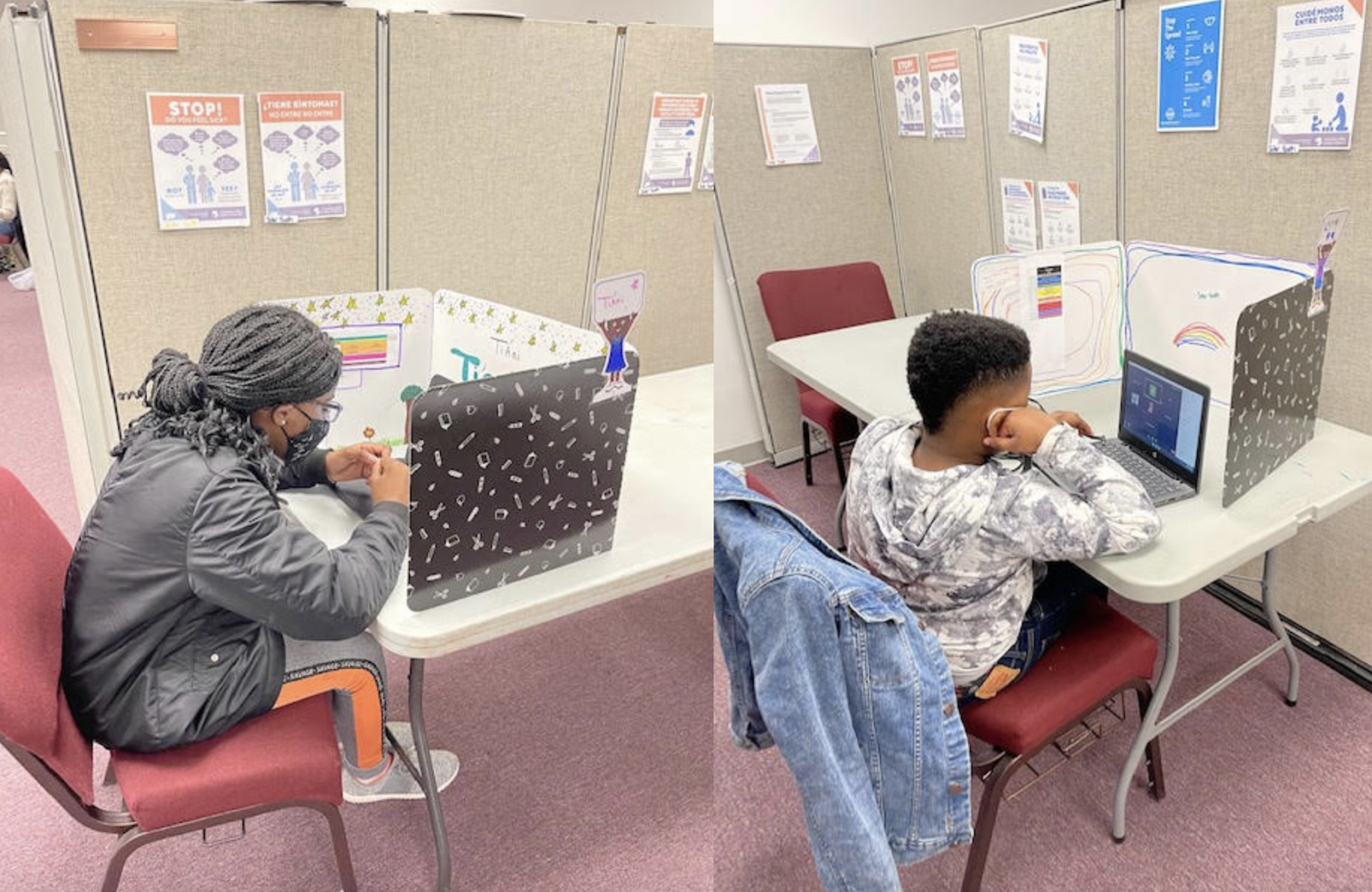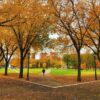Community learning hubs adapt their services as in-person school resumes
As NHPS students return to the classroom, learning hubs that developed to address the struggles of virtual learning are pivoting their programming in response to decreased demand.

Courtesy of Kim Dickey
Last fall, over 20 community learning hubs opened across New Haven to support New Haven Public Schools students with virtual learning. But as schools are slowly returning to in-person classes, the groups behind these hubs are considering how to redirect their work.
Learning hubs are supervised spaces where local students can spend their school days as they attend classes virtually. At these hubs, students can socialize safely within “pod” groups, while staff members offer individual assistance to those who are struggling with remote learning. The learning hubs also serve to lessen the child care burden on working parents.
Recently, NHPS’ move to a hybrid learning model for elementary and middle school students has led to a decrease in the demand for learning hub services. In anticipation of further school reopenings, the local groups that run New Haven’s learning hubs are adjusting to address the decreased demand and plan for eventually phasing out their services, which will likely occur by the end of the school year.
“We are planning different ideas and scenarios so we can still serve our community,” said Steve Driffin, youth and community programs manager for the education and vocational training nonprofit ConnCAT. “We’re not closing. The one thing we’ve learned is to pivot, as everyone else has done during this time.”
Four of New Haven’s nearly two dozen learning hubs are run by the city’s Youth and Recreation Department, while the others are run by churches and local nonprofits like ConnCAT, Solar Youth and the Boys and Girls Club of New Haven.
All of these learning hubs are united under a coalition organized by local mental health clinic Clifford Beers. Through this coalition, interested families can send in a single application that makes them eligible to be placed at any of the learning hubs in the city. According to Barbara Chesler, interim executive director of the Boys and Girls Club of New Haven, learning hub leaders meet virtually every Monday to discuss new challenges and developments.
“Learning on their own, it’s very difficult to keep kids’ attention,” said Won Jung ’20, director of programs and administration at the BGC. “The socialization aspect, they’ve been missing that so much. … Kids have formed really strong friendships here. And I think having that structure of going to school is really helpful.”
The learning hubs have functioned since September to help students through virtual learning, though as NHPS schools continue along their phased reopening plan, many children have chosen to attend school on in-person days but remain home during virtual days. However, there are still a number of hybrid students who continue to attend the learning hubs on their virtual days, presenting a new safety challenge.
“We’re just trying to balance it out by having virtual kids in one room [and hybrid kids in another],” Driffin said. “So bubbles are still contained.”
Additionally, attendance at the learning hubs varies depending on capacity, with the BGC serving the greatest number of students — as high as 58 at one point, according to Chesler.
But attendance rates at the learning hubs have decreased across the board in the past two months. Chesler and New Haven Youth and Recreation Department Director Gwendolyn Busch Williams told the News that they attribute this change to the district’s decision to reopen elementary and middle schools for limited in-person learning this spring.
Because schools have begun to reopen, the learning hubs run by the Youth and Recreation Department have seen a particularly low turnout. The department runs four learning hub locations, but only the East Rock learning hub has any participants — it currently serves just one family.
Despite this lack of demand, all four of the Youth and Recreation Department’s hubs are still resourced and ready to serve families if the need arises, according to Williams.
“If we received a call tomorrow, and it was 20 families that are in need of the learning hub, we have the ability to get into place and have them there by the next day,” Williams said.
At Solar Youth’s learning hubs in Fair Haven and West Rock, the decline in participants has been less extreme. According to Kim Dickey, Solar Youth’s learning hub coordinator, the West Rock location actually gained one new student this week.
But in response to the general decrease in demand, Dickey said, Solar Youth plans to do outreach work with local students instead of phasing out its learning hubs, in hopes of attracting additional participants.
“We’re doubling down efforts to try to reach out to more families within the West Rock and Fair Haven areas, whose children still may not have started going into classrooms,” Dickey said.
With the decreased demand, learning hubs also face the question of how to keep staff members employed.
Chesler said that her learning hub staff have been working full days from 8 a.m. to 5 p.m. since last September — hours that will not be practical once most students return to in-person classes.
“We have kept 17 or 18 people employed that normally either didn’t have jobs at all or were working at our after-school program,” Chesler said. “We were paying them for two and a half hours a day, now we’re paying for a 40-hour week.”
According to Williams, the staff hired for the Youth and Recreation Department learning hubs are being held in “reserve” due to the low turnout and remain on the payroll as they focus on other tasks for the city. They are currently assisting with informational calls to people who are eligible for COVID-19 vaccinations.
Overall, Dickey, Driffin, Williams and Chesler emphasized that their learning hubs will not be closing anytime in the immediate future, although they expect them to be phased out by the end of the school year, assuming that the public health situation improves.
Beyond their learning hubs, which were always intended to be a temporary solution to the hardships of virtual learning, these groups are working to meet the long-term needs of New Haven’s youth. The BGC offers after-school programming and tutoring for in-person students, and Solar Youth will soon begin to do the same, according to Dickey. The Youth and Recreation Department, the BGC and ConnCAT are all also planning to hold in-person summer programs.
“We’re not trying to replace the schools at all,” Jung said. “If they open most schools up, then we’ve done our job.”
NHPS high school students will be given the option to return to limited in-person classes on April 5.
Sylvan Lebrun | sylvan.lebrun@yale.edu
Interested in getting more news about New Haven? Join our newsletter!










